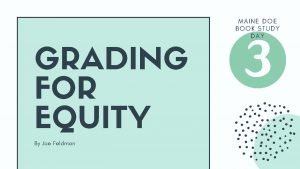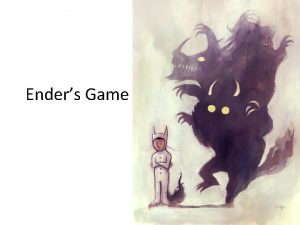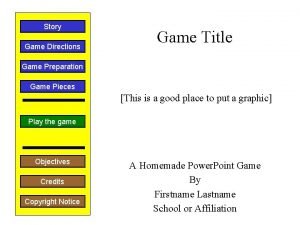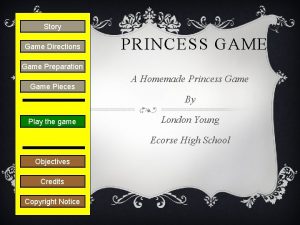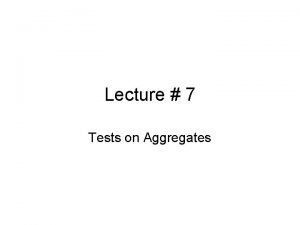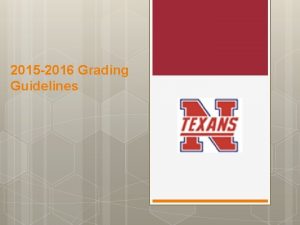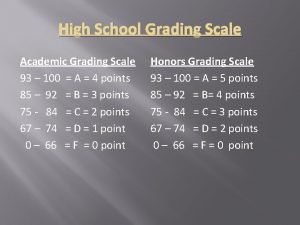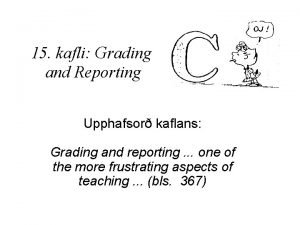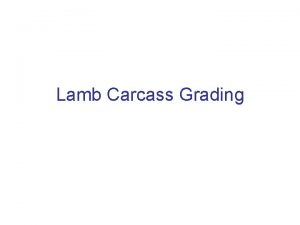The Game of Grading A Discussion of Grading























- Slides: 23

The Game of Grading A Discussion of Grading and Assessment in Higher Ed Games Programs SAN FRANCISCO, GDC 2019 Andrew Phelps Professor of Art & Design, College of Art & Design, Rochester Institute of Technology Games Scholar in Residence, School of Communications, American University, Spring 2019 President, Higher Education Video Game Alliance Founder, RIT MAGIC Center & MAGIC Spell Studios Founder, RIT School of Interactive Games & Media ANDREW PHELPS, PROFESSOR OF ART & DESIGN ANDYWORLD. IO | @RITIGM 1

TODAY’S MICRO-TALK A focus on PROCESS as a core component of assigning grades, and getting people to reflect on what grades mean as somewhat arbitrary, but sometimes important measures for both students and faculty Situating grades in an ecosystem of academic process: PROGRAM MISSION PROGRAM GOALS STUDENT LEARNING OUTCOMES COURSE OBJECTIVES [[[CLASS]]] GRADES COURSE ASSESSMENT PROGRAM ASSESSMENT UNIV PROGRAM REVIEW / ACCREDITATION ANDREW PHELPS, PROFESSOR OF ART & DESIGN ANDYWORLD. IO | @RITIGM 1

WE LEARN BY MAKING THINGS ANDREW PHELPS, PROFESSOR OF ART & DESIGN ANDYWORLD. IO | @RITIGM 1

MAKING THINGS: MAPPED TO TEACHING & LEARNING • Nearly all of my courses are project based, and involve ‘making a thing’ • The _grade_ is never about the thing made, but about the process followed while doing so • This is a really important distinction because I think what we are ultimately trying to instill is the skill and experience of how to reliably make a thing that we don’t already know how to make, a process that is preparation for the unknown ANDREW PHELPS, PROFESSOR OF ART & DESIGN ANDYWORLD. IO | @RITIGM 1

PROGRAM MISSION • The mission of the undergraduate Game Design and Development program is to prepare students for careers within the entertainment technology landscape as well as other related areas, while still pursuing a broad-based university education. The program stresses its technical roots in the Computing and Information Sciences disciplines while engaging in the breadth of development processes through experiences in game design, design process, as well as the asset creation and production pipeline. • The program focuses on interactive systems development, but meets the industry need for developers who are involved in the totality of the design process. The program is intended specifically for students who aspire to hold careers within the professional games industry or a related field such as simulation, instruction or visualization, and focuses on preparing graduates who understand the technical roots of their medium, the possibilities that creative application of software development affords, and the way in which the digital media industry operates. In addition, the program provides graduates with a core computing education that will prepare them both for graduate study in a number of computing fields and for employment in more general computing professions. ANDREW PHELPS, PROFESSOR OF ART & DESIGN ANDYWORLD. IO | @RITIGM 1

PROGRAM GOALS We expect that graduates of the Bachelor of Science in Game Design and Development program, three to five years after the date of graduation, will: A) combine concepts in essential knowledge domains such as programming, mathematics, physics, and game design towards the realization of game design and development applications or related media-centric works. B) work productively as game application developers, game designers, simulation and visualization application developers, and/or process tool developers within the games industry or a related media-centric discipline. C) effectively communicate within the profession as well as recognize and interpret technical, social, cultural, ethical, and global indicators within the field. D) work effectively in multidisciplinary concept design and/or software development teams. ANDREW PHELPS, PROFESSOR OF ART & DESIGN ANDYWORLD. IO | @RITIGM 1

STUDENT LEARNING OUTCOMES • apply knowledge of programming, math, physics, and game design to the field of game design and development (embodies Institute Program Outcomes 1 and 4 as well as contributes to Program Goals A and B). • identify, analyze, and resolve game design problems using industry-established game design and gameplay concepts (embodies Institute Program Outcomes 1 and 3 as well as contributes to Program Goals A, C, and D). • integrate game design and technology concepts in the practice of game creation (embodies Institute Outcomes 1, 4, and 5 as well as contributes to Program Goals A, B, and D). • identify and solve production pipeline issues related to the game design and development process (embodies Institute Program Outcome 1 as well as contributes to Program Goals B and D). ANDREW PHELPS, PROFESSOR OF ART & DESIGN ANDYWORLD. IO | @RITIGM 1

• apply current technology in a media-centric context (embodies Institute Program Outcomes 1 and 5 as well as contributes to Program Goals B and D). • identify, critique, and apply knowledge of media theory, mediated communication, and aesthetics towards the construction of media-centric applications (embodies Institute Program Outcomes 1, 2, and 3 as well as contributes to Program Goals C and D). • identify critical legal and ethical challenges in the design and production of games (embodies Institute Program Outcome 3 and contributes to Program Goal C). • effectively communicate technical and design concepts through writing, speech, and formal presentation (embodies Institute Program Outcome 1 as well as contributes to Program Goals C and D). • effectively participate and contribute to multidisciplinary design and development teams (embodies Institute Program Outcomes 2 and 5 as well as contributes to Program Goal D). ANDREW PHELPS, PROFESSOR OF ART & DESIGN ANDYWORLD. IO | @RITIGM 1

TEACHING GAME PRODUCTION: COURSE LEARNING OUTCOMES Course Learning Outcome 7. 1 Students will be able to identify and explain the attributes and components of the unique features and technologies in a given project. 7. 3 Students will be able to create prototypes and/or fully functional projects based on the parameters and design documents created in class. 7. 4 Students will be able to evaluate and critique prototypes and provide constructive feedback to their peers. ANDREW PHELPS, PROFESSOR OF ART & DESIGN ANDYWORLD. IO | @RITIGM 1 Assessment Method Assessed through student writings and classroom discussion/participation in class and on-line. Assessed through final project completion and peer assessments.

PRODUCTION COURSE: PROGRAM LEARNING OUTCOMES 1. apply current technology in a media. MAPPING centric context 2. effectively communicate technical and design concepts through writing, speech, and formal presentation 3. effectively participate and contribute to multidisciplinary design and development teams ANDREW PHELPS, PROFESSOR OF ART & DESIGN ANDYWORLD. IO | @RITIGM 1

PRODUCTION COURSE: DELIVERABLES • There will be daily check-ins by students with the PM. • There will be weekly update reports by every member of the class • There will be ‘milestone sprints’ as identified in the planning process (expect several of these throughout the semester, with associated due dates to be assigned during class based on the exact deliverables of the sprint) • There will be 4 major checkpoints (approximately weeks 3, 6, 9, and 12) – Exact dates will be given in class and will vary slightly based on schedules, production speed, and overall project cohesion • There will be weekly reviews of the master branch of development, for which all members of the class share responsibility. • There will be a final presentation of the game, along with associated documentation and process review, during finals week (week 16). ANDREW PHELPS, PROFESSOR OF ART & DESIGN ANDYWORLD. IO | @RITIGM 1

A FOCUS ON PROCESS, NOT ON OUTPUT ANDREW PHELPS, PROFESSOR OF ART & DESIGN ANDYWORLD. IO | @RITIGM 1

REVIEW OF DESIGNS NOT JUST IMPLEMENTATIONS ANDREW PHELPS, PROFESSOR OF ART & DESIGN ANDYWORLD. IO | @RITIGM 1

GRADING PERCENTAGES AND WEIGHTS • Nearly all of the grade will rest on the final deliverable (70%) – but with grades & discussions all along the way. This means that every discussion, opportunity, and review along the way is a chance to either continue great work and/or improve. It places the responsibility and opportunity in the hands of the students so engaged. • Peer assessment (15%) We used instruments that asked students to evaluate each other in context-aware professionalized roles relative to the structure of the course at several points during the semester, not just the end, and not just a simple scale • Documentation (15%) This was both design docs, technical documentation, presentations and materials during the process, etc. The tech makes this easier to capture. ANDREW PHELPS, PROFESSOR OF ART & DESIGN ANDYWORLD. IO | @RITIGM 1

SEVERAL OPPORTUNITIES FOR FEEDBACK & REFLECTION (AND PRE-GRADES) • Critique is about the WORK and not the PERSON – day 1 (and everyday) lesson • Variety of sources, including INDUSTRY VISITORS, SCHOOL AGED CHILDREN, STUDENT IN OTHER MAJORS, and FACULTY, STAFF, and ADMINISTRATION • 8 year-olds, dude • Internal and external points of feedback ANDREW PHELPS, PROFESSOR OF ART & DESIGN ANDYWORLD. IO | @RITIGM 1

COMMUNICATIONS INFRASTRUCTURE ANDREW PHELPS, PROFESSOR OF ART & DESIGN ANDYWORLD. IO | @RITIGM 1

WHAT BIG PROBLEMS WERE WE TRYING TO SOLVE? • COMMUNICATION – Things get “Lost in Translation” between UI/UX, art, design, dev/engineering, QA… • FORMAL and INFORMAL LEARNING – Not just skills but skills applied to complex practice, situated learning in context. “learn by making things” • CULTURAL DEV & CAPABILITY – Where do games come from? What is a repeatable design process? How do studios work? Maturity & Palette? • ACADEMIC IMMERSION – creating a shared space between computing and the arts, between research and practice… ANDREW PHELPS, PROFESSOR OF ART & DESIGN ANDYWORLD. IO | @RITIGM 1

ANDREW PHELPS, PROFESSOR OF ART & DESIGN ANDYWORLD. IO | @RITIGM 1

THIS MEANS YOU CAN “FAIL” WITH A BEAUTIFUL PRODUCT, AND “SUCCEED” EVEN IF A PRODUCT DOESN’T GEL, BY DESIGN ANDREW PHELPS, PROFESSOR OF ART & DESIGN ANDYWORLD. IO | @RITIGM 1

WE DID POST-MORTEMS FOR EVERY PROJECT, FOR EVERY PRODUCTION COURSE ANDREW PHELPS, PROFESSOR OF ART & DESIGN ANDYWORLD. IO | @RITIGM 1

ALL OF WHICH CAME BACK TO PROGRAM ASSESSMENT & REVISION ANDREW PHELPS, PROFESSOR OF ART & DESIGN ANDYWORLD. IO | @RITIGM 1

ALL OF THIS, FOR EVERY COURSE & DEGREE IS ONLINE FOR YOU IF YOU WANT IT ANDREW PHELPS, PROFESSOR OF ART & DESIGN ANDYWORLD. IO | @RITIGM 1

ANDYWORLD. IO | PROFESSORANDREWPHELPS. NET | @RITIGM 1 |ANDYMPHELPS@GMAIL. COM Thanks & Questions ANDREW PHELPS, PROFESSOR OF ART & DESIGN ANDYWORLD. IO | @RITIGM 1
 Simple distillation discussion
Simple distillation discussion Grading for equity chapter 9
Grading for equity chapter 9 Ender's game essential questions
Ender's game essential questions Half and half joy luck club
Half and half joy luck club Quá trình desamine hóa có thể tạo ra
Quá trình desamine hóa có thể tạo ra Sự nuôi và dạy con của hươu
Sự nuôi và dạy con của hươu Thế nào là mạng điện lắp đặt kiểu nổi
Thế nào là mạng điện lắp đặt kiểu nổi Các châu lục và đại dương trên thế giới
Các châu lục và đại dương trên thế giới Dạng đột biến một nhiễm là
Dạng đột biến một nhiễm là Biện pháp chống mỏi cơ
Biện pháp chống mỏi cơ Bổ thể
Bổ thể Phản ứng thế ankan
Phản ứng thế ankan Thiếu nhi thế giới liên hoan
Thiếu nhi thế giới liên hoan điện thế nghỉ
điện thế nghỉ Tia chieu sa te
Tia chieu sa te Chúa yêu trần thế
Chúa yêu trần thế Một số thể thơ truyền thống
Một số thể thơ truyền thống Trời xanh đây là của chúng ta thể thơ
Trời xanh đây là của chúng ta thể thơ Hệ hô hấp
Hệ hô hấp Công thức tiính động năng
Công thức tiính động năng Số nguyên là gì
Số nguyên là gì đặc điểm cơ thể của người tối cổ
đặc điểm cơ thể của người tối cổ Tỉ lệ cơ thể trẻ em
Tỉ lệ cơ thể trẻ em Các châu lục và đại dương trên thế giới
Các châu lục và đại dương trên thế giới

